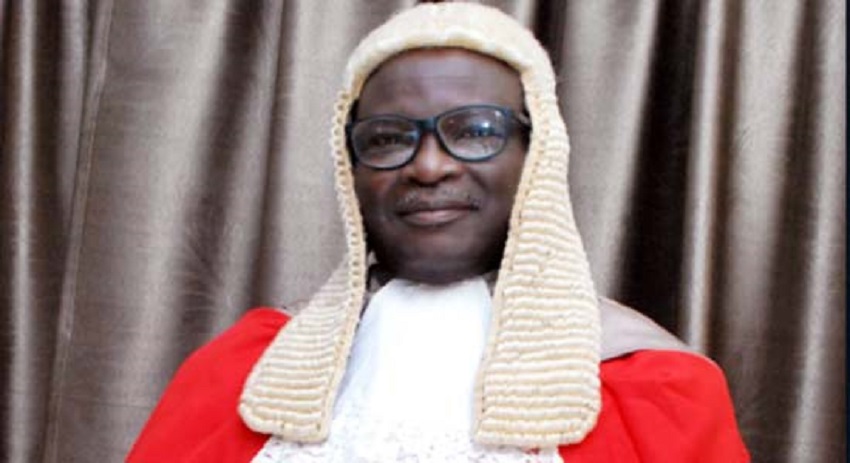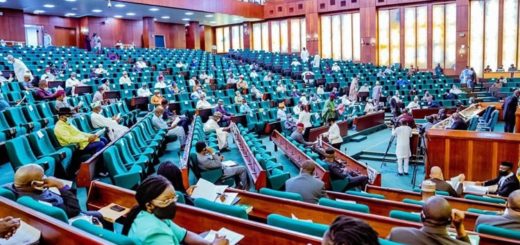My Only Regret Since I retired as a Judge is that Kogi State has failed to pay my Gratuity – Justice Ajilaye
Professor (Justice) Alaba Omolaye-Ajileye is a bundle of erudition, judicial activism and sagacity, all rolled into one. His inevitable exit from the Kogi State Judiciary last year, having attained the then mandatory retirement age of 65, brought tears to many eyes. With a sound Doctorate degree in Law, expertise in Electronic Evidence, as well as being a published author, His Lordship gave the best of himself to Kogi State and the country during his years on the Bench. Now fully settled in the Academia as a Visiting Professor of Law at the National Open University of Nigeria, Professor Ajileye told Onikepo Braithwaite and Jude Igbanoi in a conversation over the weekend, that his only regret so far, is that the Kogi State Government has failed to pay his retirement benefits and gratuity a year after his meritorious exit. He discussed a range of issues concerning the Judiciary, and expressed his concerns about the poor remuneration, conditions of service and welfare of Judges, and the much faulted process of appointment of judicial officers
Your erudition as evinced in your landmark judgements and publications, are attestations to your industry and scholarship. Many expected to see you in the ivory tower taking up a professorial chair. Many Universities are still jostling to have you. What has been your response so far? Tell us about life after your retirement from the Bench last year, after reaching the then mandatory retirement age of 65?
Thank you for your kind words. By the grace of God, I am now part of the ivory tower of academia, if that is what you mean. At one of the events of my Valedictory programme, specifically, the book launch, three universities (University of Jos, Baze University and Federal University, Lokoja) announced their readiness to offer me a professorial chair. Ultimately, I have settled down with the National Open University of Nigeria (NOUN), as a Visiting Professor. The operation of the University, as a virtual learning institution, is in tandem with my background. My post-graduate studies were carried out through virtual studies, except for the doctoral residencies that required physical presence. NOUN as a virtual institution offers several advantages, making education more accessible, flexible, and convenient. Now, I can be anywhere in the world and deliver my lectures with ease. Such benefits, are also open to students.
As I reflect on the past year in retirement, I am filled with gratitude to God Almighty and a profound sense of peace. It has been a journey of self-discovery, new beginnings, and a deepening connection with the blessings that retirement brings. God’s provision has been evident in every step, and I am truly thankful for the opportunities and challenges that have shaped this chapter of my life. I now know that retirement is not an endpoint, but a new beginning. The journey has been laden with testimonies of the goodness of God, and the boundless possibilities that unfold when we trust in His plan. This is so much so that, with every sense of sincerity, I can now say that I am thanking God that the extension of the retirement age for High Court Judges from 65 years to 70 years did not meet me, so to say. With the benefit of hindsight, I now see the life of a Judge like that of a bird that is caged. You can imagine the relief and freedom such a bird will enjoy, when released from the cage. This summarises my experience in the last year, especially with the special grace God has granted me for strength.
The only regret I have about my retirement, is the failure of the Kogi State Government to pay my gratuity one year after my retirement. I am not alone in this. Other judicial officers who retired in the last two years in Kogi State, are also affected. It has to be pointed out here that, pensions and gratuities of judicial officers are guaranteed and secured under Section 291 of 1999 Constitution, as their entitlements upon retirement. The prompt payment of the entitlement is the minimum expected from the government, in acknowledgment and recognition of the dedicated services of Judges to society. A failure to fulfil this basic obligation, amounts to a serious constitutional infraction with potential legal consequences. Therefore, I humbly urge the new government of Alhaji Usman Ododo in Kogi State to heed the counsel of President Bola Ahmed Tinubu, in urgently addressing payment of gratuities to judicial officers and other retirees owed.
The retirement age of judicial officers was recently upwardly reviewed, and it was received with so much commendation. Would you say it is a positive development for the nation’s Judiciary? If so, in what specific sense? If not, why?
To a great extent, it is a positive development. Judges who continue to serve beyond the age of 65, can bring with them years of experience and accumulated expertise. This can contribute, to the overall quality and depth of judicial decision-making. The hypothesis here is, that the more experienced a Judge is, the more proficient he is likely to be in adjudication. The corollary is also true. If you have a bad Judge who is not ready to learn or improve himself or herself over the years, it means, the system will have to contend with him until he attains the age of 70 years. That is a calamity. In any event, I will suggest that a means be devised for a periodic health assessment for judicial officers, to ensure that they remain fit for their roles mentally and physically. As the Chief Judge of Lagos State advised recently, if the health of a Judge is failing him or her, he or she should quit the stage.
Despite the advancement of technology, Judges still write in longhand, even with the attendant health implications. What, in your view, can be done to ameliorate this needless strain on the health of their Lordships? Why is it that quite a number of Judges seem to pass away, soon after retirement?
The fact that Judges still write in longhand is one clear evidence of our backwardness, which is antithetical to the current technological age. Unfortunately, many courts don’t seem to see anything wrong in this archaic practice, as it has not become an issue at all to them to be addressed. As far as they are concerned, we must continue to do the same thing the same way, over and over again. Of course, this is the very definition of conservatism. In my view, our conservatism should not make us resist change. We must move with times, and seek to innovate in whatever we are doing.
A lot can be done, to ameliorate the needless strain associated with longhand writing. Courts without money can begin with simple employment of stenographers and transcribers who are proficient in shorthand or stenography, to assist Judges in capturing proceedings accurately. This can significantly reduce the burden of writing. I would like to add here very quickly, that the world of today has even gone beyond stenography. We now have digital transcription technology, that can convert spoken words during proceedings into written text. Speech-to-text technology also allows Judges to dictate their judgements and rulings verbally, which can be converted to texts. Legal research and drafting software, can also be installed for Judges.
The phenomenon of Judges dying shortly after retirement, can be attributed to many factors within a range of possibilities. I will mention just three. Foremost among these, is financial stress. Judges who face financial challenges post-retirement, may experience stress that may impact both their mental and physical health. Financial concerns can contribute to anxiety, depression, and other health issues. That is why payment of gratuities to Judges, must not be taken with levity. Closely associated with this, is that some Judges may retire with existing health conditions that become complicated, more pronounced, or challenging to manage. Thirdly, adjusting to a new life without the structured routine of work can also be emotionally challenging. Judges who struggle with this transition, have their overall well-being diminished.
Tell us about some of the difficulties that Judges face, with regard to their conditions of service? Are you satisfied with the state of the Nigerian Judiciary, the way judicial officers are appointed etc? Or what do you think can be done to improve it?
Of course, talking about the conditions of service of the Nigerian Judiciary, the remuneration of Judges readily comes to mind. My one-year experience in retirement, has revealed to me that Judges are not properly remunerated. They put in so much effort, over which they are poorly rewarded. They are overworked and overstressed with work in the daytime, and keep sleepless nights. Out there, people receive so much for doing so little. In most cases, health and ergonomics supports are absent. There is also the absence of basic amenities that should ensure a conducive working environment.
I would like to dwell more on the process of appointment of Judges. I addressed it in my Valedictory Speech, where I identified four evils. The first evil, is the lack of transparency in the process. I mentioned that the process is often shrouded in secrecy, under a clandestine atmosphere.
Second, I stated, and I still stand by the position that when recommendations are required, they serve no purpose. They are mere rituals, designed to fulfil all righteousness. The number of recommendations a candidate receives from Judges and Justices, guarantees nothing. Those who will be appointed will still be appointed, with or without recommendations.
The third evil is that, I have seen that the person a candidate knows matters a lot. And, that person must carry a lot of “weight.” You rarely find anyone being appointed without one big man or woman behind, speaking for him or her. The implication of this is that a candidate who does not have an influential personality behind them, may be left in limbo. The truth remains that, in this country, regrettably, we have not been able to devise an objective standard or parameter to identify and fish out our best for the Bench, as we do for football tournaments.
The last evil is that, where a candidate comes from matters. In Nigerian parlance, it is called federal character. The point must be made here that, there is nothing evil on the face of the principle of federal character. What is evil, is the way the principle is applied by functionaries of government. This underscores the point that, it is the human being that makes or mars an institution. If we can overcome these evils, it shall be well with the Judiciary of Nigeria, and, indeed, by extension, Nigeria as a whole.
What can be done to make the wheels of Nigerian justice move faster? What can be done to reduce the time frame in which cases are completed?
Answering a question on improving the efficiency of the Nigerian justice system and reducing the time frame for case completion, will require the writing of a thesis. I will mention just a few measures here. Suffice it to say here that, it demands comprehensive reforms and strategic interventions.
First, there must be a case management system that embraces and utilises technology to track and manage cases throughout the judicial process, from the point of filing to the judgement stage. This includes electronic filing, digital case records, and automated scheduling to reduce administrative delays.
Second, specialised courts and tribunals ought to be established to handle specific types of cases, such as commercial disputes, corruption, or cybercrimes. Specialisation can lead to quicker resolution, due to the expertise of Judges and streamlined processes.
Third, we must be prepared to encourage and promote the use of alternative dispute resolution mechanisms, such as mediation and arbitration, to resolve disputes outside the traditional court system. ADR can be faster, and less resource-intensive. More Judges should be appointed and trained to handle caseloads effectively. We can go on and on.
In recent times there have been arguments about the carrier path of Judges. It does appear that there is no clear path to the Bench. Some have argued that Judges should be appointed from the Bar directly, while some argue that it should be through the Magistracy. Having served on the Bench for a reasonable length of time, on which side of the divide are you?
Appointment to the Bench, should be diversified. It should not be seen as exclusive to a particular group of persons. No group should see itself as having the monopoly of appointment to the Bench, at any level. The Bench belongs to both the Bar and the Bench. Appointment to the Bench, should be a healthy competition between the Bar and the Bench. This is the only way we can ensure a dynamic, inclusive, and effective judicial system.
What is of importance, is for the selection process to be transparent and to prioritise merit, ensuring that individuals with the necessary qualifications, capabilities and capacities are appointed, regardless of their specific legal background.
Prof, some described your exit from the Bench as bitter-sweet. Kindly, share some words on why the aphorism. Could it be because of your expertise in electronic evidence?
There were many articles written by eminent journalists on my retirement, and widely published. One of them was written by Bolanle Bolawole, former Editor of Punch Newspaper and a columnist in the Sunday Tribune, which he titled: “Omolaye-Ajileye – A Judge’s Bitter-Sweet Exit from the Bench”. Idowu Akinlotan of The Nation newspaper also wrote another one titled: “Sad to See Erudite Justice Omolaye-Ajileye Retire”. There were other articles written by those who know me well. I felt humbled and emotionally touched, by the contents of the articles. The sentiments in them consisted of the fact that, given my contributions to the jurisprudence of electronic evidence in Nigeria, I could still be useful to advance or develop that aspect of the law if I remained on the Bench. Indeed, many agitations trailed my exit from the Bench, as people clamoured for my appointment to a higher court, if only to escape retiring at the age of 65 years. This did not happen, and today, as I said earlier, I thank God that it did not happen. One of these eminent persons who publicly made pronouncements on the issue at every opportunity open to him, is the President of the Nigerian Bar Association, Mr Y. C. Maikyau, SAN. I want to use this medium to appreciate him, for the concerns he expressed. My response to the clamour was captured in my Valedictory Speech, where I said, the ways of God are higher than our ways and that he will always put us where he wants us to be, which is always the best place to be at any particular time.
We are sure that you know that many refer to you are as the ‘Digital Judge’ because of your undoubted expertise in Electronic Evidence. What are your views on virtual court proceedings which was recently introduced into our jurisprudence, but not yet fully deepened? Should that be the way to go? How well will embracing a higher level of technology work, when there are many judicial officers who are still not computer literate?
Let me say straight away here that, there is no justification why any judicial officer of our modern and digital age should not be computer literate. Virtual hearings have become an important component of the justice system, all around the world. There are many advantages associated with them, for which they should be highly recommended. Virtual proceedings, especially in the context of the digital age, are the “to-go” solution depending on various factors. Virtual hearings enhance accessibility to the justice system by allowing participants to join remotely, overcoming geographical barriers. They can also streamline court processes, reduce delays, and lead to more efficient case management. Participants can save time and costs associated with travel, accommodation, and other logistics related to attending in-person hearings. In operating virtual hearings, we must be prepared nevertheless, to address some challenges and considerations, such as inaccessibility to reliable technology or internet connectivity. Security and confidentiality of virtual proceedings, are crucial to maintaining the integrity of the legal process. We must ensure they are intact.
As a Nigerian, what are you expecting from the Tinubu administration vis-à-vis fighting corruption, insecurity and getting the Nigerian economy on the road to recovery? Are they on the right track?
I mince no words in saying that, the Tinubu administration is on the right track considering his overall approach to governance, using the fight against corruption, insecurity, and the state of the economy as parameters. It is too early to condemn him. One undeniable fact about President Tinubu is that, in him, we have a President who listens to complaints and agitations. You can also see that, he visibly takes steps to address them. In the circumstances, we need to be patient with him, bearing in mind the popular aphorism that there is no gain without pain.
Thank you Prof.
-THISDAY














